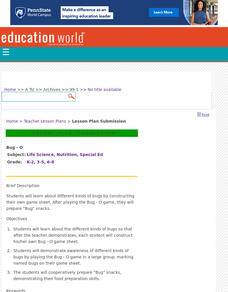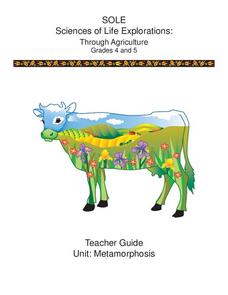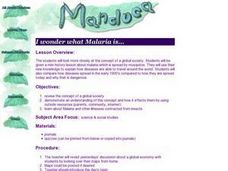Curated OER
Life Cycle
Young scientists explore the world of entomology. They focus on the life cycle of butterflies and moths. They utilize the entire school year in order to see how butterfly eggs turn into the chrysallis, then into a butterfly, who then...
Curated OER
Bug-O
Middle school special education young scholars (moderate to severe) learn about insects by playing an entomological version of bingo. They cut out pictures of different bugs and glue them onto a grid. Place the game card inside a sheet...
Curated OER
Animal Fact or Fiction?
Read and discuss the article "Welcome to Cicadaville (Enter at Your Own Risk)" to gain a better understanding around the confusion regarding cicadas and locust swarms. In groups your young analysts research statements about animals to...
Curated OER
Forensic Entomology: What the Blowfly Saw
Students read a paragraph describing various insects and decomposition rates, then fill in the table indicating when the three insects arrived or left the body. They write paragraphs explaining when the person died, and how they know.
University of Kentucky
Beneficial Bug Scavenger Hunt
Many people think of bugs as annoying pests to be squashed, but most insects and spiders are beneficial, eating the actual pests or pollinating plants. After reviewing some of the common bugs in your area (they may differ from those...
Cornell University
Wasps and Ladybugs
Can a good bug ever become a bad bug? An elementary entomology resource explores what to do when too many ladybugs or too many bees are in your home and can become a problem.
Curated OER
Science: Entomology in Action
Students discover how coroners use insect life cycles to estimate the time of death in cases. they describe how forensic entomologists combine environmental factors with insect life cycles to note the changes. Students examine an...
Curated OER
Bugs-Eye View
Students research different bugs and insects and write letters from bugs' and insects' points of view to humankind.
Curated OER
Pollinator Habitats
Students read and discuss background information included with this lesson. They brainstorm the best sources for developing a list of native or migratory pollinators. Students work in groups to design habitats based on information...
Curated OER
Activity Plan 5-6: Bugs, Bugs, Bugs!
Students become entomologists for a day. In this life science lesson, students go on an insect hunt and investigate insects and their homes. This leads to the creation of an insect by each student. Lesson includes a take-home activity...
Curated OER
Be on the Lookout!
Students create "Wanted" posters for destructive bugs. They practice research skills as they learn about the characteristics, diets, habitats, and habits of a variety of bugs.
EnLiST
Trap Your Own Insects: What’s in Your Backyard?
Young entomologists construct three types of insect traps—pitfall, pollinator, and panel—before setting their traps out and observing what they caught. They then observe what types of insects the different traps attract.
Cornell University
Metamorphosis
Looking for an insect unit that addresses multiple skill strategies? Young entomologists explore multiple life cycles of insects that go through metamorphosis. The brainteasers and mobile activity spark learner interest before guiding...
Cornell University
Too Much of a Good Thing?
Continuing their study of beneficial insects, young entomologists discover where in the world some of these bugs are. By labeling, coloring, and using the scale on a map, pupils explore the territories and arrival of the Asian lady...
Curated OER
Cockroaches
Learners listen to a lecture on cockroaches. They work in pairs to design a cockroach trap and attempt to trap a specimen. They complete various other cockroach-related activities.
Curated OER
Going Buggy!
Students study bugs over a four week period. For this insect collection of activities, students observe insects covering basic science concepts and skills, such as classification, observation, and responses to habitat. Students develop...
Curated OER
I Wonder How the Manduca Life Cycle Compares To the Human Life Cycle...
Students study life cycles including developing their understanding of the human life cycle. They decide where they are in the human life cycle and provide reasons for that placement. They compare the human life cycle to that of the...
Curated OER
Manduca
Students investigate the basic survival needs of both hornworms and humans. They compare and contrast the them by making a class list.
Curated OER
I Wonder What a Pest Is...
Students observe what animals are considered to be pests and why. They conduct a mock trial of a honeybee arguing if it is a pest or not. They determine pros and cons of honeybees to prepare for the trial.
Curated OER
I Wonder How Fast Manduca Grows Compared To Me
Students study the Manduca bug and its growth data. They look for patterns and compare their own growth rate to that of the Manduca.
Curated OER
I Wonder How Manduca Breathe
Students observe a Manduca bug as it is dropped in a glass of water and hypothesise how it breathes. They compare this to how humans and other creatures breathe and record their findings in their science journal.
Curated OER
I Wonder What Malaria is
Young scholars examine the disease malaria. They compare how diseases were spread in the early 1900's compared to how they are spread today and discuss why that is dangerous. They take a survey to see how much they know about insects...
Curated OER
Manduca
Students study the definition of a "global society". They take this knowledge and speculate about the positive and negative ramifications of living in a global society.
Curated OER
I Wonder What Other Dangerous Diseases Insects Spread...
Students use the internet to research diseases spread by insects. They create a brochure using the information they gathered. They present their project to the class.
Other popular searches
- Forensic Entomology
- Forensic Science Entomology
- Forensics Entomology
- Entomology Water Insects
- Entomology River
- Entomology Jeoprody
- Entomology Latin
- Entomology Jeopardy
- Entomology "Planet"
- Entomology Planet
- Entomology Zoology
- Entomology "Planet

























